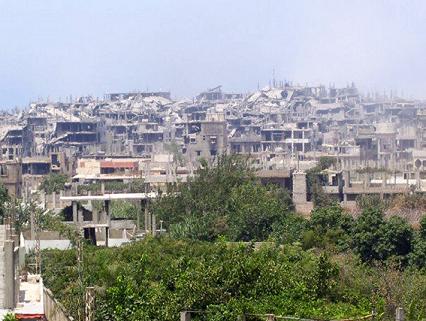The past several months have been Lebanon's coldest winter in 25 years, and Hanin Rafae is struggling to keep her family warm. Since her home has no fireplace, she and her five sons and six daughters huddle nightly around a fire on the patio overlooking the Mediterranean Sea.
Yet even more foreboding than the bitter winter cold, Rafae says, is the nation's declining economy, which worsened here after a three-month conflict between the Lebanese military and a group of al Qaeda-linked militants holed up in a Palestinian refugee camp down the hill. The fighting, which ended in September, destroyed most of the Nahr al Bared camp and forced its 33,000 residents to flee the area. Palestinian stores, which had offered much lower consumer prices than Lebanese shopkeepers outside the camp, were also damaged.
"I try to save money by shopping less," said the 60-year-old Rafae as she warmed her hands over a charcoal pit.
Since the summer war in 2006 between the militant Shiite group Hezbollah and Israel, the rate of inflation in Lebanon has more than doubled to 5.6 percent. Unemployment is at 20 percent, and 28 percent of the nation's 4 million inhabitants now live below the poverty line, according to CIA data.
But in Bibneen and other surrounding villages in northern Lebanon, Palestinian stores had been a safety valve during times of inflation. Since Palestinians are excluded from paying sales tax, they offered cheaper products, and camp merchants had used the sizable Palestinian diaspora in neighboring Arab states as a de facto trading network. Many goods sold at Nahr al Bared were smuggled across the porous Syrian border, eliminating import duties, residents say.
"The Palestinians of Nahr al Bared sought out the consumer," said Ismael Khassan, a Beirut architect. "In the '40s and '50s, they went on donkeys up into the hills and neighboring villages and showed merchandise to the locals. They sold door-to-door. They established a social link with the Lebanese, which encouraged them to come down to the camp and trade."
But that changed when Nahr al Bared, one of 12 Palestinian camps in Lebanon and located some 10 miles from the port city of Tripoli, became a virtual war zone after Fatah al Islam fighters infiltrated the camp. Even though the militants who sparked the conflict were mostly foreigners, many locals blame the Palestinians for giving them a haven.
"The Lebanese had a good relationship with the Palestinians," said Nadim Talawi, mayor of Mohamra, a town adjacent to the camp. "But some villages beside the camp lost soldiers and civilians, and this has generated hatred and tension."
Lebanon has long restricted Palestinian refugees from working at most jobs and owning property. Such restrictions have mirrored a general distrust regarding what some here call "the visitors." But in Bibneen and other villages near Nahr al Bard, trade had minimized most suspicions.
Rafae would regularly walk down the hill and purchase a loaf of bread for half price, 5 kilos of cooking oil for $4.50 instead of $7 and a carton of cigarettes for $4 instead of $6.
But those days are over. "Many Lebanese were killed, so we won't buy there," said Rafae. "I prefer to buy from the Lebanese now - not from Palestinians."
Rafae recalled how stray bullets whizzed above her patio on a nearly daily basis, killing 10 civilians. About 170 Lebanese soldiers were also killed, some of whom were from surrounding villages.
But with the camp's cheap products gone, the reality of rising inflation and a 10 percent sales tax has forced many to rethink their opposition to Palestinians coming back to the camp.
"The cost of living has risen from between 60 percent to 70 percent for most people here," said Talawi. "Many are going into debt."
Bibneen resident Abdal Qader Saad says his family's monthly food bill has increased from $200 to $330 since the Palestinians left. "My wife had to go to take a job to help make ends meet," he said.
As a result, Talawi says most residents want the Palestinians to return as soon as possible. "They feel the (economic) situation will change because of their return, and they want to facilitate this," he said, by leasing land around Nahr al Bared to the United Nations for temporary housing while the old camp is being rebuilt.
To date, some 600 Palestinian families have returned to live in the least damaged sections. By late August, the United Nations is expected to provide 1,500 prefabricated housing units for those whose homes were destroyed.
Mohamed Saleh al Hajj, 66, returned to find his two electrical shops completely destroyed by army shells. He has set up shop in a garage with an array of plugs, adapters, sockets and wiring. "I was a rich man before. Now, I am very poor," he said with a chuckle.
But for many locals, the sight of a few reopened businesses is a signal of hope.
"It's difficult to live and work without them," said Rafae's 20-year-old son Mahmud. "Of course, I will go back to the camp to buy things."



